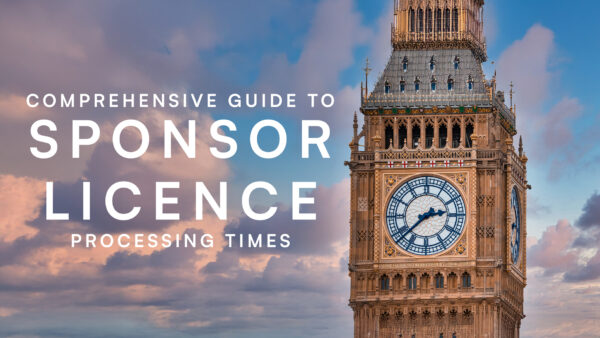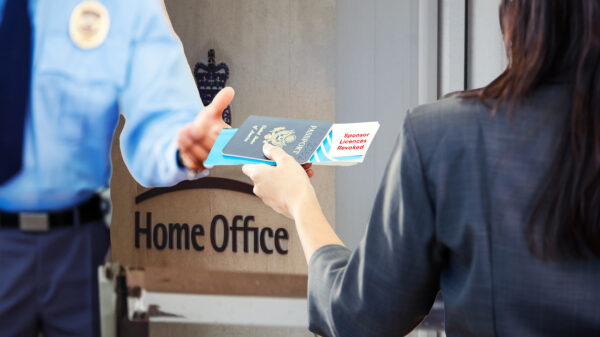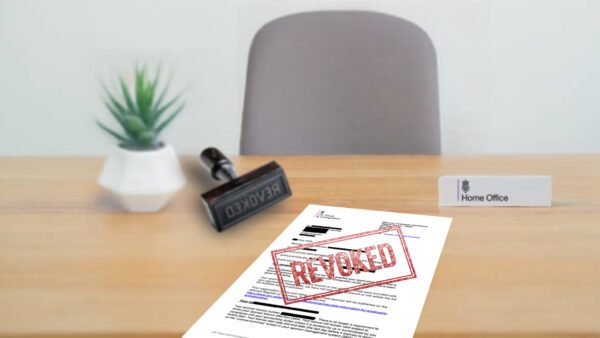Latest Posts

A Comprehensive Guide to Sponsor Licence Processing Times and Priority Services for UK Employers
Securing a sponsor licence is a critical step for UK businesses seeking to employ skilled workers. Understanding the processing times and available priority services is crucial for employers aiming to make a smooth application and use the Sponsorship Management System (SMS) efficiently.
Below is a comprehensive overview of the processing times for Skilled Worker Sponsor Licence applications, as well as the post-licence procedures for making amendments to sponsorship details. Understanding these timelines and options is crucial for ensuring a smooth application process and the efficient use of the Sponsorship Management System (SMS).
Sponsor Licence Applications
Upon submission of a sponsor licence application online, businesses must ensure that all required supporting documents are provided electronically to the Home Office within five working days.
- Standard Sponsor Licence: Typically, a decision is made within 6-8 weeks from the submission of the application. However, the processing time may be extended depending on the complexity of the application or the need for further checks.
- Priority Service: The Home Office offers an expedited processing service for an additional fee of £500. This service aims to process applications within 10 working days. While the service provides a faster turnaround, it is important to note that this timeframe is not guaranteed and is subject to capacity and processing demands.
- Certificate of Sponsorship (CoS) Application: After obtaining the sponsor licence, employers will need to apply for a Certificate of Sponsorship (CoS) for the proposed worker. A standard CoS application is processed within one working day. A Defined CoS (DCoS) generally takes up to one week, though this may be extended if additional checks or information are required by the Home Office.
- Skilled Worker Visa Application: For Skilled Workers, visa applications are generally processed within 15 working days for applications made outside the UK. For in-country applicants, processing time generally takes up to 8 weeks. Priority services are available to expedite this process.
Previously, securing a priority slot was highly competitive, with applicants needing to log in at precisely 08:59 am each weekday to secure one of the limited 30 day priority slots. However, the Home Office has since removed the reference to this fixed daily cap, possibly indicating that there may no longer be a set limit on the number of available priority slots. This remains subject to formal confirmation.
In my experience, securing a sponsor licence and successfully obtaining a Skilled Worker visa can be completed in as little as one to two weeks, particularly when utilising the priority service.
Once granted, a sponsor licence remains valid, provided the business continues to meet all regulations.
Post-Licence Applications
Following the issuance of a sponsor licence, businesses may need to make amendments to their sponsorship details. The priority change of circumstances service allows sponsors to fast-track certain post-licence requests, ensuring that modifications are processed efficiently.
Eligible Requests for Post-Licence Priority Service:
- Allocation of an additional Certificate of Sponsorship (CoS)
- Annual Certificate of Sponsorship (CoS) allocation
- Adding or changing a Level 1 user
- Replacing or amending the Authorising Officer (AO)
- Replacing or amending the Key Contact (KC)
- Adding a representative
- Amending organisational details (e.g. relocation to new premises)
Priority Service:
- Priority Service operates Monday to Friday, from 7:00 am to 5:00 pm.
- A fee of £200 applies for each request.
- A maximum of 100 priority service requests will be accepted each day. Any amendments to the limit will be communicated through the SMS message board.
If a request is accepted, the applicant will receive an email notification and must complete payment within 72 hours. The processing period for the request will begin on the next working day following the payment confirmation. Generally, the Home office will process the request within five working days. However, should the request be deemed complex or require further verification, the processing time may extend beyond the standard five-day period. In such cases, the Authorising Officer will be notified via email.
Conclusion
For businesses applying for a sponsor licence or making amendments to an existing licence, understanding the processing times and priority service options is essential. While the enhanced pre-licence service and post-licence priority service can expedite decisions, it is important to recognise that availability and response times are contingent on UKVI’s capacity. Employers must remain vigilant and stay informed of any updates from the Home Office to ensure smooth navigation through the sponsorship system.
If you require guidance for a sponsor licence application, contact our corporate immigration team using the form below.
Read More
Court of Appeal Confirms No Obligation for Home Office to Conduct Impact Assessments Before Revoking Sponsor Licences
The Court of Appeal has recently confirmed in R (on the application of Leeds City College) v Secretary of State for the Home Department [2024] EWCA Civ 123 that the Home Office is not legally required to carry out an impact assessment before revoking a sponsor licence. This decision has significant implications for UK businesses and organisations reliant on sponsored workers, particularly in sectors facing acute labour shortages.
Legal Analysis: Implications of the Ruling
The ruling reinforces the discretionary powers of the Home Office when managing sponsor licences. While a judicial review remains an option for businesses facing adverse decisions, the threshold for successfully challenging a revocation remains high. The courts have consistently deferred to the Home Office’s powers in enforcing immigration control, particularly where allegations of non-compliance exist.
This strict approach highlights the principle that holding a sponsor licence is a privilege rather than a right. Businesses must therefore approach their duties with diligence, ensuring they maintain accurate records, comply with all reporting obligations, and promptly address any compliance risks to avoid penalties or revocation.
Compliance and Risk Management
Given the Home Office’s stringent enforcement regime, businesses should consider the following proactive measures:
- Regular Compliance Audits: Conduct internal reviews to identify and rectify any gaps in compliance.
- Staff Training: Ensure HR and compliance teams are well-versed in sponsor duties and reporting obligations.
- Legal Review: Engage immigration legal experts to assess risk exposure and provide guidance on maintaining best practices.
A failure to uphold compliance obligations can not only lead to licence revocation but may also impact an organisation’s ability to recruit international talent in the future.
Broader Policy Context and Sectoral Impact
The ruling also comes amidst broader discussions about the UK’s immigration policies. Recent reports from the National Audit Office (NAO) suggest that the Home Office lacks a full understanding of how the skilled worker visa route is used and its economic impact. The frequent changes to the Skilled Worker visa rules—such as the 2022 expansion to include care workers and the subsequent tightening of eligibility criteria in 2024—demonstrate the unpredictable nature of immigration policy in the UK.
A lack of impact assessments in the revocation process means that entire industries, particularly those reliant on international talent, may face disruptions with little recourse. The case of AG Recruitment, whose licence was revoked after concerns about foreign workers incurring large debts to unregulated brokers, underscores the broader consequences of such decisions.
Other sources, such as think tank reports and parliamentary briefings, have raised concerns over the Home Office’s policy approach, suggesting that greater transparency and oversight could benefit businesses and workers alike.
How Quastels LLP Can Assist
At Quastels LLP, we specialise in immigration law and sponsor compliance, offering tailored solutions for businesses navigating the complexities of UK immigration regulations. Our services include:
- Sponsor Licence Compliance Audits: Helping businesses mitigate risks and ensure full compliance.
- Legal Representation: Assisting with challenges to licence suspensions or revocations.
- Strategic Immigration Advice: Guiding businesses on best practices for hiring and retaining international talent.
If your business holds a sponsor licence or is at risk of enforcement action, contact our team today for expert legal advice and strategic support.
Read More
Sponsor Licence Revocation: Immediate Steps to Protect Your Business
Holding a Sponsor Licence is a significant responsibility for UK businesses employing skilled workers from overseas. The Home Office imposes strict compliance requirements on sponsors, and failure to meet these obligations can result in sponsor licence revocation. This can have severe consequences, including the loss of a business’s ability to employ migrant workers, reputational damage, and, in some cases, financial penalties.
If your sponsor licence is at risk of revocation- or has already been revoked- it is essential to act immediately to mitigate the impact on your business and your sponsored employees. At Quastels, we provide urgent legal assistance to businesses facing compliance investigations and sponsor licence revocation, helping them protect their workforce and maintain their operations.
Understanding Sponsor Licence Revocation
A sponsor licence may be revoked when the Home Office determines that a business has failed to meet its compliance obligations. Unlike suspension, which allows a business time to correct compliance issues, revocation is final, and there is no right of appeal. This means that businesses must take proactive steps to prevent revocation and, where necessary, challenge the decision through alternative legal remedies.
Common Reasons for Sponsor Licence Revocation
The Home Office may revoke a sponsor licence for several reasons: including:
1. Non-Compliance with Sponsor Duties
Sponsors are required to maintain rigorous compliance standards, including:
- Keeping accurate records of employee work status and right to work documents
- Reporting relevant changes in sponsored employees’ circumstances
- Ensuring that sponsored workers meet the requirements of their visa category
Failure to meet these obligations can lead to revocation.
2. Failure to Pass a Home Office Compliance Audit
The Home Office conducts unannounced audits to assess whether businesses are meeting their sponsorship duties. A failed audit- due to poor record-keeping, an inability to provide required documentation, or a lack of proper HR systems- can result in immediate revocation.
3. Employing Workers Without the Right to Work
Hiring employees who do not have legal permission to work in the UK can lead to civil penalties, reputational damage, and the revocation of a sponsor licence.
4. Abuse of the Sponsorship System
If the Home Office determines that a business is using its sponsor licence for fraudulent purposes- such assigning Certificates of Sponsorship (CoS) to non-genuine workers- the licence can be revoked immediately.
5. Salary or Job Role Non-Compliance
Sponsored employees must be paid the minimum salary set out in their visa requirements and must be working in the role specified in their CoS. Any deviation from these requirements without proper notification to the Home Office may result in revocation.
Immediate Steps to Take After Sponsor Licence Revocation
If your sponsor licence has been revoked, immediate action is necessary to protect your business and employees. The following steps can help mitigate the impact:
1. Assess the Grounds for Revocation
The Home Office will issue a revocation letter detailing the reasons for its decision. It is crucial to carefully review this letter to understand the specific compliance breaches identified.
2. Seek Urgent Legal Advice
Given that the sponsor licence is final with no right of appeal, it is essential to seek expert legal assistance immediately. At Quastels, we assess the strength of your case and advise on the most appropriate course of action, including:
- Judicial Review- If the revocation was unlawful or procedurally unfair, it may be possible to challenge the decision through a Judicial Review in the High Court.
- Fresh Sponsor Licence Application- In some cases, it may be possible to reapply for a sponsor licence after addressing compliance issues.
3. Communicate with Affected Employees
Once a licence is revoked, all sponsored employees lose their right to work in the UK and must either:
- Find a new sponsor within 60 days, or
- Leave the UK at the end of their visa curtailment period
Employers should communicate openly with affected employees and provide support in exploring alternative options.
4. Conduct an Internal Compliance Review
If there is an opportunity to challenge the decision or reapply in the future, it is essential to address the issues raised by the Home Office. This may involve:
- Implementing improved HR systems and compliance procedures
- conducting internal audits to ensure proper record-keeping
- Training staff on sponsorship compliance obligations
Can a Sponsor Licence Be Reinstated?
While there is no direct right of appeal against revocation, businesses may explore the following options:
- Judicial Review- If the revocation was unlawful or based on incorrect evidence, a challenge may be brought in the courts. Judicial Review is a complex legal process, but in cases where the Home Office has made errors, it can result in the decision being overturned.
- Fresh Sponsor Licence Application- If the business can demonstrate that is has addressed previous compliance issues, it may be possible to submit a new sponsor licence application. However, this is generally not permitted for at least 12 months after revocation, unless there are exceptional circumstances.
Preventing Sponsor Licence Revocation
Prevention is always better than remedy. Businesses should adopt a proactive approach to compliance to minimise the risk of licence revocation. Key best practices include:
1. Conduct Regular Compliance Audits
Regular internal audits can help identify potential compliance issues before they become serious problems. This includes ensuring that all employee records are up to date and that reporting duties are being met.
2. Maintain Robust HR Systems
A well-organised HR system is critical for tracking sponsored employees’ visa statuses, work conditions, and reporting obligations. Digital compliance tracking can help businesses manage this more effectively.
3. Prepare for Unannounced Home Office Audits
The Home Office has the authority to conduct unannounced compliance visits. Businesses should ensure they are always audit-ready by maintaining complete and accessible records.
4. Ensure Employees Are Aware of Compliance Obligations
HR teams and line managers should be trained in sponsor licence compliance requirements to ensure the business is fully aligned with Home Office regulations.
How Quastels Can Assist
At Quastels, we provide specialist legal support to businesses facing sponsor licence revocation. Our services include:
- Urgent legal representation for businesses challenging revocation decisions
- Judicial Review applications in cases of unlawful Home Office decisions
- Sponsor Licence compliance audits to prevent future issues
- Strategic advice on reapplying for a licence after revocation
Our team has extensive experience in navigating the complexities of UK business immigration law, ensuring that our clients remain compliant and protected from enforcement actions.
Conclusion
Sponsor licence revocation is a serious issue that can significantly disrupt a business’s operations and workforce. Given the lack of a formal appeal process, businesses must act quickly to assess their options, seek legal advice, and take corrective measures.
At Quastels, we provide immediate assistance to businesses facing revocation, helping them protect their workforce, challenge unfair decisions, and implement compliance solutions to prevent future issues.
If your sponsor licence has been revoked- or if you are concerned about compliance risks- contact us today for expert legal support.
Read More